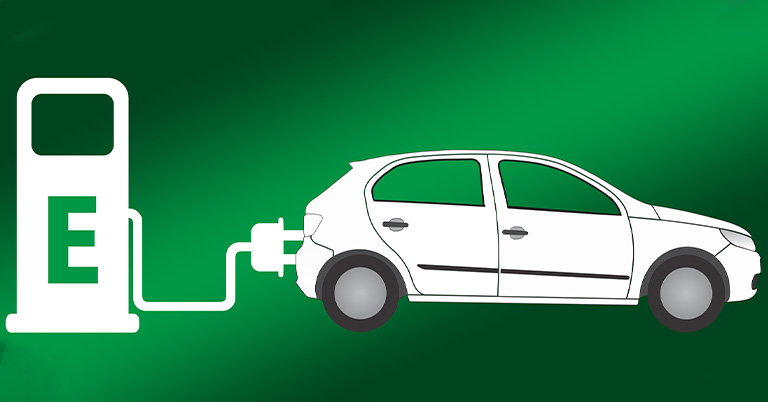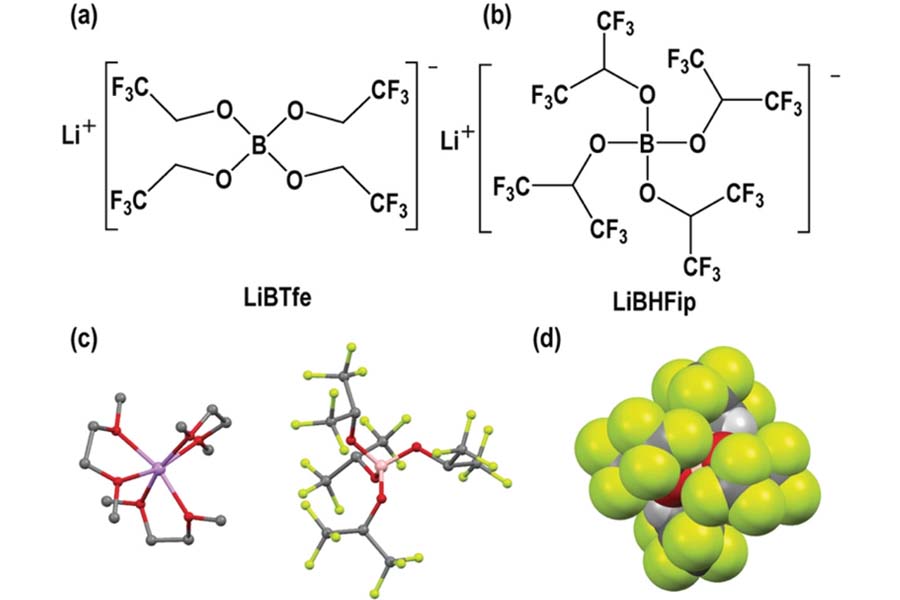
Lithium-ion is the dominant battery type in portable devices such as phones, tablets, and computers. Electric vehicles, on the other hand, share a different story since lithium-ion batteries pose a potential threat on such a large scale. Now, scientists have tested a fluoroborate salt, which can make lithium-ion cells more dependable for electric vehicles and large-scale energy storage systems.
Fluoroborate salt for Lithium-ion batteries:
While most EV components are similar to those found in conventional vehicles, the main difference lies in the battery. Their batteries are larger, heavier, and consist of hundreds of individual lithium-ion cells. They contain dangerous chemicals and can explode if disassembled wrongly.
Altering the salt
Professor Doug MacFarlane and Dr. Mega Kar in partnership with Calix Ltd have come up with a solution to make Lithium-ion batteries more suitable for electric vehicles.
-

Image: Structure of Lithium Salt (Advanced Energy Materials)
The salt being used in these batteries is lithium hexafluorophosphate, which is toxic and can cause fire and safety hazards. Still, with portable devices, it is more secure. But, as mentioned before, with electric vehicles and outdoor grid-scale energy storage systems, their potential hazard is exponentially magnified.
Now, scientists in their recent researches have described a novel salt for lithium batteries. Their aim is to develop safe fluoroborate salts which don’t undergo catastrophic reactions even when exposed to air.
Lead study author, Dr. Binayak Roy from Monash University School of Chemistry says “the main challenge with the new fluoroborate salt was to synthesize it with battery-grade purity which we have been able to do by a recrystallization process”.
- Also Read:
Test
To put it through its paces, the salt was put together with the lithium battery and lithium manganese oxide cathodes. And the results were intriguing. Even after being exposed to air, the cell cycled over 1000 times. In comparison to the hyper-sensitive hexafluorophosphate salt, this is an inconceivable accomplishment.
As per Dr. Roy, when coupled with a new cathode material in a high voltage lithium battery, this electrolyte beats the traditional salt. Additionally, at higher voltages, as necessary for next-generation batteries, the salt is extremely stable on aluminum current collectors.
Fluoroborate salt for Lithium-ion batteries: What’s next
The study represents a significant step forward for the EV sector. While it addresses one of the market’s key concerns, battery hazard, it also ensures vehicle sustainability. As a result, electric vehicles could be safer and cheaper to operate.
- Meanwhile, check out our review of the Samsung Galaxy Z Flip 3.







![Best Gaming Laptops in Nepal Under Rs. 250,000 (रु 2.5 Lakhs) [2025] Best Gaming Laptops Under 2.5 lakhs in Nepal [Feb 2025 Update]](https://cdn.gadgetbytenepal.com/wp-content/uploads/2025/02/Best-Gaming-Laptops-Under-2.5-lakhs-in-Nepal-Feb-2025-Update.jpg)
![Best Gaming Laptops in Nepal Under Rs. 120,000 (रु 1.2 Lakhs) [2025] Best Budget Gaming Laptops Under Rs 120000 in Nepal 2025 Update](https://cdn.gadgetbytenepal.com/wp-content/uploads/2025/05/Best-Budget-Gaming-Laptops-Under-Rs-120000-in-Nepal-2024-Update.jpg)
![Best Laptops Under Rs. 80,000 in Nepal [2025] Best Laptops Under 80,000 in Nepal March 2025 Update](https://cdn.gadgetbytenepal.com/wp-content/uploads/2025/03/Best-Laptops-Under-80000-in-Nepal-March-2025-Update.jpg)
![Best Gaming Laptops in Nepal Under Rs. 200,000 (रु 2 Lakhs) [2025] Best gaming lapotp under 2 lakhs Nepal Feb 2025](https://cdn.gadgetbytenepal.com/wp-content/uploads/2025/01/Best-Gaming-Laptops-Under-2-Lakh-Nepal-Feb-2025-Update.jpg)

![Best Mobile Phones Under Rs. 15,000 in Nepal [Updated 2025] Best Phones Under 15000 in Nepal 2024 Budget Smartphones Cheap Affordable](https://cdn.gadgetbytenepal.com/wp-content/uploads/2024/03/Best-Phones-Under-15000-in-Nepal-2024.jpg)
![Best Mobile Phones Under Rs. 20,000 in Nepal [Updated] Best Mobile Phones Under NPR 20000 in Nepal 2023 Updated Samsung Xiaomi Redmi POCO Realme Narzo Benco](https://cdn.gadgetbytenepal.com/wp-content/uploads/2024/01/Best-Phones-Under-20000-in-Nepal-2024.jpg)
![Best Mobile Phones Under Rs. 30,000 in Nepal [Updated 2025] Best Phones Under 30000 in Nepal](https://cdn.gadgetbytenepal.com/wp-content/uploads/2025/01/Best-Phones-Under-30000-in-Nepal.jpg)
![Best Mobile Phones Under Rs. 40,000 in Nepal [Updated 2025] Best Phones Under 40000 in Nepal 2024 Smartphones Mobile Midrange](https://cdn.gadgetbytenepal.com/wp-content/uploads/2024/02/Best-Phones-Under-40000-in-Nepal-2024.jpg)
![Best Mobile Phones Under Rs. 50,000 in Nepal [Updated 2025] Best Phones Under 50000 in Nepal](https://cdn.gadgetbytenepal.com/wp-content/uploads/2025/01/Best-Phones-Under-50000-in-Nepal.jpg)
![Best Flagship Smartphones To Buy In Nepal [Updated] Best flagship phone 2025](https://cdn.gadgetbytenepal.com/wp-content/uploads/2024/07/Best-Flagship-Phones-who-is-it-ft-1.jpg)